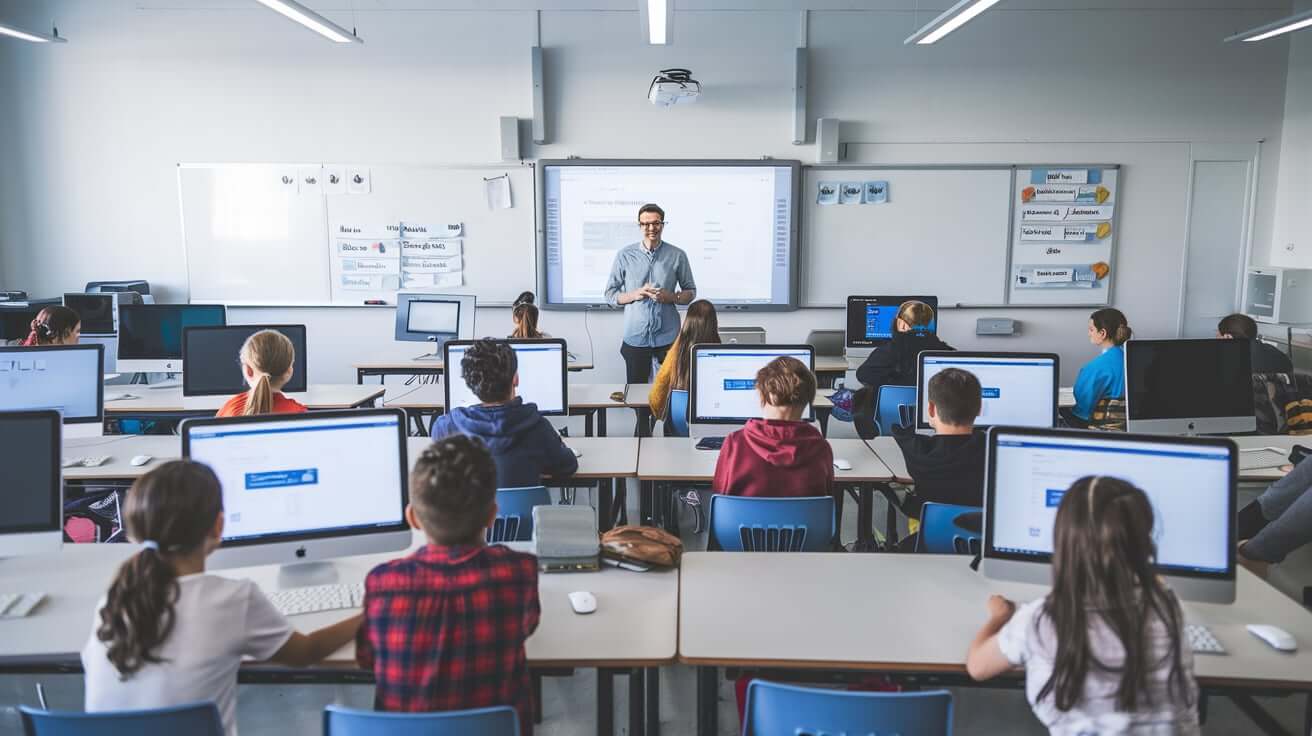
Imagine stepping into a classroom where lessons are enriched with interactive quizzes, digital storytelling, and multimedia resources. Such an environment is powered by an educator who understands digital literacy. As technology reshapes education, digital literacy is no longer optional for educators—it is necessary for effective teaching and learning.
Educators have two critical responsibilities: preparing students for a technology-driven world and mastering their teaching tools. This article explores five reasons digital literacy is indispensable for educators. It offers actionable insights to help them embrace it effectively.
Table of Content
Enhances Teaching Efficiency

Digital tools are widely recognized for simplifying routine administrative tasks and enabling educators to focus more on meaningful teaching activities. Learning Management Systems (LMS) such as Canvas, Google Classroom, and Edmodo efficiently manage tasks such as organizing assignments, tracking student submissions, and automating grading processes.
These platforms ensure that teachers spend less time on repetitive paperwork and more time on lesson planning and student interaction. Furthermore, communication tools, including email and messaging apps, facilitate seamless interaction between teachers, students, and parents. By enabling real-time updates and feedback, these tools eliminate delays and improve the overall communication process within the educational environment.
In addition to streamlining administrative tasks, digital literacy empowers educators to access a wide range of resources, such as e-books, online courses, and academic journals. This access allows teachers to diversify their teaching materials and ensure that lessons are tailored to meet their students' varied learning needs.
For example, e-books and multimedia content can be combined into lessons to cater to visual learners. At the same time, audio resources can benefit auditory learners. Educators also benefit from staying updated on the latest developments in their subject areas, ensuring that their lesson plans remain relevant and engaging.
A real-life example of the impact of digital tools on teaching efficiency is Ms. Patel, a dedicated science teacher who uses Google Sheets to manage attendance and monitor her students' performance. This approach saves her five hours every week, which she can reinvest in designing innovative lesson plans and providing personalized mentoring to her students. Such practical applications of digital literacy highlight how technology can transform teaching practices, making classrooms more dynamic and interactive.
Improves Student Engagement
Interactive digital tools transform traditional lessons into dynamic, engaging experiences. These tools encourage active participation, making learning enjoyable and memorable. Gamified learning platforms such as Kahoot and Quizizz turn quizzes into fun, competitive activities that motivate students to engage with the material. These platforms also provide instant feedback, enabling students and teachers to identify areas for improvement.
Augmented Reality (AR) applications, like Merge EDU, bring abstract concepts to life by offering immersive experiences. For exploration, students can explore the solar system through AR, providing a hands-on understanding of complex astronomical phenomena. Similarly, virtual labs allow students to conduct science experiments in a safe, controlled digital environment, eliminating logistical constraints while fostering curiosity and critical thinking.
Digital tools are also effective in addressing diverse learning styles. Visual learners benefit from infographics and videos that present information in a structured, visually appealing format. Auditory learners, on the other hand, gain value from podcasts and audio lectures that enhance understanding through detailed explanations. Kinesthetic learners thrive on interactive simulations and drag-and-drop exercises that enable hands-on exploration of concepts.
A 2022 EdTech survey supporting these approaches revealed that 78% of students reported increased interest and better retention when interactive tools were integrated into lessons. This data underscores the significant impact of digital literacy on student engagement, making it a cornerstone of modern education.
Prepares Students for the Future
Digital literacy equips students with the skills they need to succeed in a rapidly evolving world. By including digital tools in the classroom, educators help students develop critical competencies such as problem-solving, critical thinking, and effective communication. These skills are crucial for excelling academically and are highly valued in the professional world.
One of digital literacy's most significant contributions is its ability to bridge the digital divide. Teachers are crucial in ensuring equitable access to technology, enabling all students to build foundational digital skills regardless of socioeconomic background. By introducing digital tools, educators empower students to navigate and utilize technology effectively, leveling the playing field for underprivileged learners.
A compelling example of this impact comes from a rural school in Nepal that introduced free online coding classes. Within a year, 40% of the students began participating in regional coding competitions. This experience boosted their confidence and empowered them with invaluable skills in the digital economy. Such initiatives demonstrate how digital literacy can open doors to previously inaccessible opportunities, preparing students for a technology-driven future.
Supports Professional Development
Digital literacy is a gateway to continuous professional growth for educators. Digitally literate teachers have access to many online resources and learning opportunities. Platforms like Coursera and Udemy offer affordable courses and certifications that enable educators to upskill in various areas, from instructional design to classroom management. These platforms provide the flexibility to learn at one's own pace, making them accessible for busy professionals.
Webinars and virtual conferences further enhance professional development by connecting educators with global experts and the latest trends in education. These events provide valuable insights into innovative teaching strategies, classroom technologies, and emerging educational theories, providing teachers remain at the forefront of their field.
Digital platforms like LinkedIn and specialized forums also facilitate collaboration and networking. Teachers can share strategies, exchange lesson plans, and seek advice on addressing classroom challenges. This sense of community fosters professional growth and innovation, enabling educators to learn from one another's experiences.
For example, Mr. Chen, a history teacher, regularly attends online workshops on digital storytelling. He has significantly increased student engagement and participation by incorporating storytelling techniques into his lessons. His experience highlights how digital literacy can transform teaching practices while fostering professional development.
Promotes Digital Citizenship
Teaching digital citizenship is an essential aspect of digital literacy. Educators are crucial in guiding students to use technology responsibly and ethically. This includes respecting copyright laws, avoiding plagiarism, and practicing secure online behaviors, such as safeguarding personal information. Teachers help students become conscientious digital citizens who contribute positively to the online community by instilling these values.
Digital literacy also equips educators to address the challenge of misinformation. By teaching students how to evaluate online content critically, educators enable them to identify credible sources, understand biases, and distinguish between reliable and unreliable information. This skill is crucial in today's information-saturated environment, where the ability to discern fact from fiction is vital.
A real-world example can be seen in a U.S. classroom where a teacher designed a lesson plan to identify fake news. After completing the lesson, 90% of the students reported feeling more confident in evaluating the credibility of online content. Such initiatives demonstrate the profound impact educators can have in promoting digital citizenship and fostering a generation of informed, responsible technology users.
Conclusion
Digital literacy is not just about mastering technology—it's about transforming education to meet the needs of modern learners. By embracing digital tools and fostering critical thinking, educators can:
-
Enhance teaching efficiency.
-
Engage students in meaningful ways.
-
Prepare students for future challenges.
Take the first step today. Explore one new digital tool and integrate it into your teaching. You may be surprised by its impact on your students and your growth.
FAQs
What is digital literacy, and why does it matter for educators?
Digital literacy is the efficient use of digital tools. It helps educators enhance teaching and connect with tech-savvy students.
How can teachers improve their digital literacy?
Teachers can enroll in online courses, attend webinars, and practice using digital tools regularly.
What are some popular digital tools for educators?
Tools like Google Classroom, Kahoot, and Microsoft Teams are widely used for managing classes and engaging students.
How does digital literacy impact student engagement?
Interactive tools like gamified quizzes and virtual labs make learning more engaging and improve retention.
Why is teaching digital citizenship important?
It ensures students use technology responsibly, recognize credible sources, and understand the ethical implications of their digital actions.
Also Read
Digital Literacy Skills in the 21st Century
What Is Digital Literacy? Importance & Benefits
Why Digital Literacy Is Important for Teachers and Learners
Why Digital Literacy Matters for Students in the Modern World
Digital Literacy: The Essential Skill of Today's World
Digital Literacy: Navigating Success in the Modern World
Why Digital Literacy is Crucial for Student Success
Why Students Need Digital Literacy in the 21st Century: Essential Skills
Top 10 Benefits of Digital Literacy for Teachers in Education
Digital Literacy


